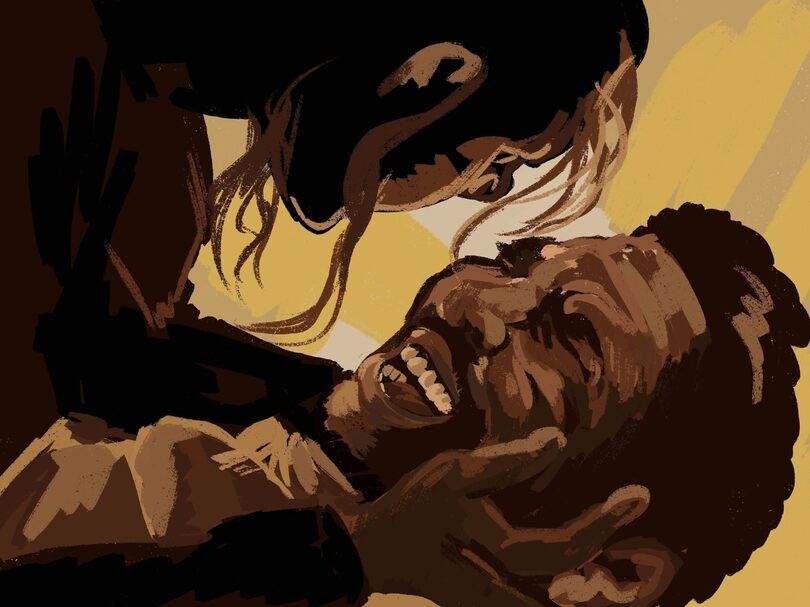‘Hurry Up Tomorrow’ highlights strong visuals despite shallowness

Abel Tesfaye and Jenna Ortega engage in intense acting sequences in “Hurry Up Tomorrow.” However, the acting wasn’t enough to make up for underdeveloped characters. Julia English | Cartoonist
Get the latest Syracuse news delivered right to your inbox.
Subscribe to our newsletter here.
The Weeknd has long revealed cynical depictions of his own life and the scenes around him through music laced with themes of angst, heartbreak and obsession. Over the years, his lyrics have either resonated with die-hard fans or cringed out critics, and his latest acting project is no different.
“Hurry Up Tomorrow” is part concert film, part psychological thriller and was created in conjunction with The Weeknd’s latest album of the same name. In fact, the film tells a story using many tracks from the album.
But what is intended to be a joint project tying music to a compelling story ultimately falls short with its uninspired writing and depthless characters.
The film is directed by Trey Edward Shults, and written by Shults, Reza Fahim and Abel Tesfaye. It follows The Weeknd (Tesfaye), as he combats the pressures of stardom while coming to terms with his own self-destructive psyche.
“Hurry Up Tomorrow” opens with The Weeknd preparing for a show while listening to a voicemail on repeat from an unidentified ex-girlfriend (Riley Keough), where she berates him for the way he treated her. Mirroring the way The Weeknd often incorporates voicemails into his music, this introduction serves as an insight into the star’s personal life. He struggles with the heartbreak by drowning himself in mindless partying alongside his best friend and manager, Lee (Barry Keoghan).
Also in the opening sequence, we’re introduced to Anima (Jenna Ortega), an enigmatic and troubled girl. She sets fire to her presumed childhood home, leaving the audience to wonder what led her to that point.
The film dives into a plotline representing many themes, from the fear of being alone to hiding from manifestations of one’s own identity. Through Lee and Anima, the film makes a superficial attempt at representing the masculine and feminine sides of The Weeknd’s psyche.

Sophia Burke | Digital Design Director
The Weeknd and Anima’s first encounter comes after she attends his concert, where he retreats from the stage after a vocal strain incident. Running away from his failure, the singer sneaks off and collides with Anima in the street. The two spend the night together roaming the Santa Monica Pier. They ultimately end up in a hotel room, where The Weeknd plays Anima a stripped-down version of the titular track, “Hurry Up Tomorrow” from his phone, prompting her to share her traumas with him.
Around the one-hour mark of the film, the plot takes a darker, more psychological turn when Anima refuses to let Abel leave the hotel room, causing him to spiral into a hallucinogenic trip. He awakens to find himself tied to the bed, where Anima demands the “truth” out of him, itching to know why he has such self-destructive tendencies.
Ortega delivers a powerful performance, but her acting chops develop too far into the movie and don’t make up for the underdeveloped writing of her character. While Ortega portrays Anima emotionally, the audience knows little to nothing about her outside of the surface-level trauma she shares with The Weeknd.
In a moment of rising action, Anima sings The Weeknd’s own songs to him, including “Blinding Lights” and “Gasoline.” She breaks down the lyrics, praising them for their deeper themes and furthering her investigation into The Weeknd and his “truth.” It’s a confusing and shallow sequence of scenes that serves to show Anima’s connection to The Weeknd’s music, but comes off as Tesfaye simply stroking his own ego.
At the film’s climax, Anima becomes full-fledged in her violent obsession with The Weeknd, killing Lee when he shows up at the hotel in search of the singer. In a moment of rage at The Weeknd’s inability to comply with her demands, Anima pours gasoline over his body, ready to set him aflame. The Weeknd sings “Hurry Up Tomorrow” to Anima, evoking an emotional reaction out of her where she finally lets him go.
The next scene is of the burning hotel room and The Weeknd walking out alone. With no trace of Lee or Anima, it’s unclear if they ever really existed, or if their characters were merely combating forces fighting for control of The Weeknd’s own psyche. The film’s ambiguous ending suggests The Weeknd is shedding his old ways and leaving his toxic traits to burn.
The thriller’s plot intends to paint the picture of an artist struggling with identity, but ultimately, “Hurry Up Tomorrow” is a vapid vanity project. Many aspects of the film disappoint, from the character dynamics to the sequences laced with strobing lights and synth pop that amount to nothing of substance.
Some of the film’s only redeeming qualities come in the form of style. On the surface, it’s aesthetically pleasing and showcases Shults’ A24-inspired cinematic techniques, with shifting aspect ratios and spinning shots. But it also makes “Hurry Up Tomorrow” look like a glorified music video, as the script offers no more depth or development than one.
Not even Ortega and Keoghan’s intense performances can save the hollow, self-absorbed plot. As for Tesfaye, the film represents a metaphorical burning of his persona as The Weeknd, as seen through a consistent fire motif. Tesfaye has publicly announced he will no longer release music under the pseudonym The Weeknd.
Similarly to his performance in HBO’s “The Idol,” Tesfaye proves that his acting endeavors, while meant to be personal works, amount to nothing more than self-serving passion projects.






